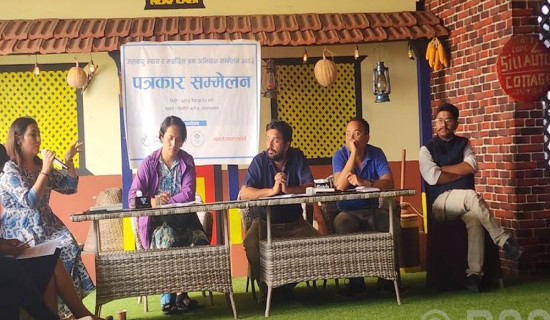- Saturday, 3 May 2025
Unabated domestic violence cases call for social, legal reforms
By Arpana Adhikari,Kathmandu, Dec. 3: Menuka (name changed), a 35-year-old woman from Sindhupalchowk, carries the burden of a life woven with agonizing chapters.
Married off at 16, her
days became a haunting tale of abuse. The first lash of violence struck after
one year, when her husband beat her for a late-cooked meal, as she was busy
working in a crop field.
She carried the weight
of blame, believing obedience could silence the abuse. However, instead of
subsiding, the physical abuse turned into relentless assault.
Sharing her plight, Menuka
said, “Even after three years of marriage, my inability to conceive added agony
to my life. It wasn't just my husband, but his family also subjected me to
mental torment for this.”
She shared she endured all
the pain thinking that her relentless service would earn his family's love one
day. But nothing changed.
Once, her husband's
brutality almost cost her an eye when he beat her with a water pipe, she said,
adding, “Witnessing my injuries, my neighbours took me to the health post,
where I was treated and advised to seek legal action against him.”
She went to the nearby
police station and filed a case against her husband thinking of getting
justice. He was released later after he pledged to refrain from repeating the
offense, leading to the police settling the case.
She hoped physical
assaults would come to an end, and for a few months, her husband refrained from
doing so. However, his family persisted in pressuring her mentally, blaming her
for tarnishing their family image.
Despite enduring
physical assaults and her husband's subsequent betrayal by marrying another
woman six years into their marriage, Menuka opted not to pursue legal action,
realising that the case would end up in reconciliation. “I feared losing my
shelter and means of sustenance.”
Lacking education and
job prospects, she endured the torment for 19 years before finally seeking
shelter with her parents.
But unfortunately, she
again faced mistreatment from her brother and his wife. So she recently moved
to Kathmandu and is working as a domestic worker in Koteshwor. With tears in
her eyes, she said, "Women have nowhere to call home."
Equally distressing is
the story of 21-year-old Soniya (name changed) from Rautahat. Despite battling
a severe heart ailment, Soniya was denied treatment by her family solely
because she is a daughter.
Growing up in a poor
Madhesi family alongside her three siblings, two sisters and one brother, she developed
heart ailment when she was 16.
Because of the
prevailing cultural preference for sons over daughters, her family refrained
from providing her the costly treatment, said Soniya.
Her parents followed
the advice of their relatives and neighbours, who suggested that investing in a
daughter's treatment wouldn't yield any returns for them, she said.
“Despite having a
family, I was left to die with the complication. If my brother had suffered
from the same problem, my parents would have spared no effort to support him,”
she said.
Lacking the energy to
fight against her family's prejudice and her willpower to live, she left home
and sought support from numerous individuals to aid in her treatment. She is
now receiving free treatment at Shahid Gangalal National Heart Centre.
These stories shed
light on the distressing reality of domestic violence. Yet they represent only
a fraction of thousands of untold stories of domestic violence in the country.
According to the
Domestic Violence Prevention and Control Act, 2009, domestic violence takes
multiple forms - physical, sexual, emotional, psychological and financial.
However, the financial
abuse, which involves behaviours that control a women’s ability to acquire, use
and maintain economic resources, is often overlooked.
Situation of domestic violence
in Nepal
According to the data
of Nepal Police, cases of gender-based violence have increased at an alarming
rate, with 20,753 cases reported between July 2022 to July 2023.
Of the total cases of
GBV registered in the fiscal year 2022/23, 80 per cent are found to be of domestic
violence.
A total of 16,519 cases
of domestic violence were reported in the period. Of this, 7,813 cases were of
physical violence, 6,995 were of mental violence, 1,704 cases were of economic
violence and seven cases were of sexual violence, the report stated.
Similarly, the cases of
domestic violence accounted for almost 80 per cent of the 21,447 complaints
registered with Police in fiscal year 2021/22.
Over the period of 10
years, the number of domestic violence cases witnessed a nearly tenfold
increase, jumping from 1,800 cases in fiscal year 2012/13.
Despite the increasing
reported cases, many cases of domestic violence remained underreported due to the
limited access to protection mechanism, legal treatment, and justice for
victims.
Chief of Women,
Children and Senior Citizen Service Directorate, Senior Superintendent of
Police (SSP) Dr. Manoj Kumar K.C. said the reported cases of domestic violence
have increased in recent years due to the awareness and sensitization.
Women are now empowered
and they now know their rights that they should not tolerate such violence, he
said, adding, “So they freely lodge complaints against the abuser.”
“But we still believe
that this is not the actual status of domestic violence. Many cases still
remain unreported due to our social and cultural values. So, the Nepal Police
is planning to carry out a baseline survey on this,” he added.
Status of victims of
domestic violence
As per the police
report, a significant majority, comprising 13,454 individuals, were reported as
being illiterate.
Only a small fraction
of 148 victims had completed a Bachelor's degree or higher education, 841
victims had education up to grade 12, 1,672 had completed the school level and
421 are literate.
Similarly, the majority
of the victims, totaling 9,155 were identified as homemakers whereas, 4,839
were engaged in agricultural work, 313 were employed in various jobs, 368 were
involved in business, 1,507 were working as daily wage labourers and 354 were
students.
Regarding the
survivors' relationship with perpetrators in domestic violence cases, the
report from Women Rehabilitation Centre (WOREC) indicates that 77.28 per cent of
the crimes were perpetrated by husbands, while the remaining 22.72 per cent were
committed by other family members.
According to the police
report, women aged between 26-35 are more prone to experience domestic
violence, followed by those aged 19-25 and 36-45 years.
Factors that beget domestic
violence
In a society with
patriarchal norms, violence against women stems from the unequal power dynamics
between men and women, said advocate and women activist Meera Dhungana.
“Social stigma,
poverty, lack of awareness, lower socioeconomic status, illiteracy, lower
household income, unequal gender norms, and limited access to education stand
as significant contributing factors to violence against women in Nepal,” she
added.
Victims reluctant to
pursue legal action
According to the
Domestic Violence Act 2009, a person who commits domestic violence is subject
to a fine of Rs. 3,000 to 25,000 or six month’s imprisonment or both, depending
on the severity of the crime.
Despite the increasing
instances of domestic violence, many victims continue to endure their suffering
silently.
Thousands of domestic
violence cases are registered at the women cell of Nepal Police, Women
Commission and local bodies but almost none or a handful of victims go to the court
to prosecute their perpetrators. The significant proportion of these cases
ultimately conclude through settlement.
According to the annual
report of the Office of the Attorney General, in the fiscal year 2021/22, there
was not a single case of domestic violence handled by the office of the Attorney
General.
SSP Dr. K.C. said it is
because Nepal’s law itself favours mediation over prosecution, as domestic
violence is regarded to be a family affair.
He said, “If all
avenues for compromise and reconciliation have been exhausted, and in instances
of serious offences, such as rape and murder, a case will be filed in the respective
district court.”
According to women
activists, the key reasons women refrain from approaching the court is due to
recommendations of police and concerned authorities for couples or family
members to resolve the matter between themselves.
The victims are also compelled to reach a compromise
with perpetrators due to family pressure, social stigma and financial
dependence on perpetrators, said advocate Dhungana.
She said not all
offenses are suitable for mediation. In cases involving physical harm or
threats to a person's well-being, reconciliation should not be chosen.
In some cases, attempts
at reconciliation have resulted in severe consequences, she said, adding,
“There is a need to review the law because once misunderstandings surface in a
relationship, it requires significant efforts to mend.”
SPP Dr. K.C. mentioned
that the police have also acknowledged the necessity for a review of the prevalent
law.
The women activists
also highlighted the failures of state mechanism to support the victims.
State efforts to
prevent GBV and state of shelter homes
Chief women development
officer of Gender Based Violence Prevention Division under the Ministry of
Women, Children and Senior Citizens, Mamata Bista, said the ministry has implemented
numerous programmes, such as President Women Upliftment Programme, aimed at
bolstering gender equality and economic empowerment.
This approach is
pivotal in addressing the primary reasons behind the persistence of gender-based
violence, she added.
The government has also
introduced gender equality policy, running gender sensitivity training,
established women cells in police stations and One Stop Crisis Management
Centres (OCMC) in district level hospitals to provide integrated services to
survivors of GBV, she added.
However, the ministry
has not instituted any specific programme dedicated to preventing GBV apart
from organising the annual 16-day campaign against gender-based violence.
Bista mentioned that
the government's budget cuts have posed a challenge in implementing programmes
as initially anticipated.
Moreover, she asserted
that following the shift to federalism, the government delegated the power of
the district women and children offices to the local bodies.
“Because the local
bodies do not hold direct accountability towards the ministry, there is a lack
of coordination. Consequently, the ministry remains unaware of the specific
efforts made by the local units to address gender-based violence (GBV),” she
added.
Similarly, the ministry
lacks information regarding the number of safe shelter homes specifically
designated for survivors of gender-based violence.
Bista mentioned that a
total of 21 shelter homes, managed by district women and children offices, have
been transferred to municipal levels.
Additionally, several
municipal levels and NGOs are operating their shelter homes but the Ministry
lacks specific information regarding their numbers, she added.
According to her, the
Ministry has forwarded the process of constructing long-term rehabilitation
centers in Madhes, Lumbini and Sudurpaschim provinces.
















